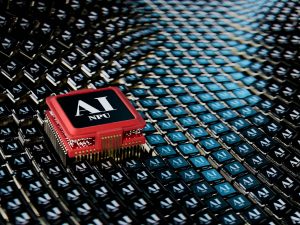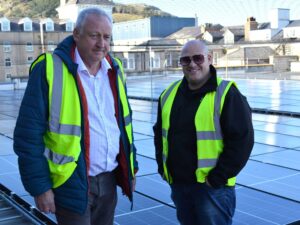Manchester Roadshows Raise Awareness Of Artificial Intelligence In Local Communities

A series of interactive Artificial Intelligence roadshows have been hosted in residential areas of Manchester during April and May, offering communities the opportunity to work with researchers to develop a better understanding of what AI is, what it can do, and its relevance to people outside the tech world.
The roadshows are part of the first phase of the People’s Panel for AI project developed by The Manchester Metropolitan University in collaboration with Manchester’s Digital Strategy. The project aims to democratise approaches to AI by empowering residents with the knowledge and skills to meaningfully shape the use of AI in front line service delivery.
Systemic challenges can preclude diverse community perspectives from being represented in research and development processes in service delivery, reducing the use, effectiveness, and inclusivity of new initiatives within the communities they are intended to serve.
To widen the accessibility of the training to include a more diverse range of people, sessions were launched in areas of Greater Manchester identified by the Digital Inclusion Risk Index (DERI) as being at greatest risk of digital exclusion. The first five roadshows were delivered within community spaces in Cheetham Hill, Miles Platting and Newton Heath, Harpurhey, and Moston, at no cost to participants.
Early data indicates that removing financial and geographic challenges to participation has been successful in engaging a wide range of residents, including those from backgrounds currently underrepresented in the digital and technology sectors. Across the five roadshows, sessions welcomed residents ranging in age 18 to over 64, including 58% from minoritised backgrounds; 56% female; and 17% that live with an impairment, health condition, or learning difference that impacts their everyday life.
During each roadshow session, researchers facilitated an introduction to AI, its applications, and its impact on everyday life. After establishing a baseline for understanding, researchers and residents explored contemporary AI use cases through discussion and debate. Topics explored included the ethical considerations behind the use of AI in student essays; the trustworthiness of automated decision-making in social care scenarios; and participants’ levels of confidence in allowing an elderly relative to use a self-driving wheelchair.
Initial reception to the roadshows has been overwhelmingly positive, with participants rating their enjoyment of the sessions as an 8.3 on average, out of a possible score of 10. Survey feedback collected before and after roadshow sessions also revealed a significant improvement in residents’ understanding of AI. Awareness of how AI is used in everyday life, trust in AI systems, and confidence in challenging automated decisions all increased by over 30% on average.
Sofia, a Fine Arts student, visited the roadshow to learn more about AI after noticing an increase in conversations around the subject within her university. “It’s been really interesting,” she said. “The group interaction with the questions and case studies have been helpful. I now know a lot more about AI. It’s good to have that information and to be aware of how it’s being used.”
Keeley Crockett , Professor in Computational Intelligence at the Manchester Metropolitan University, commented, “Sofia’s experience underscores the importance of initiatives like the AI Roadshows in bridging the gap between emerging technologies and the wider community. As AI tools and systems become increasingly prevalent, it has been a privilege to empower local communities to share their fears, hopes, and ambitions for the use of AI in their everyday lives.”
To date the roadshows have engaged 41 residents across Greater Manchester, with over half of participants expressing interest in becoming part of the People’s Panel for AI. The People’s Panel, which launches in June, will enable participants to apply their training to real-world use cases by sharing concerns, insights, and feedback on potential applications of AI in service delivery at Manchester City Council.
“Through advocating greater collaboration between residents and public services, we want to lead by example in delivering services that are aligned with the needs of our diverse communities,” said Councillor Rabnawaz Akbar, Executive Member for Finances and Resources at Manchester City Council. “We look forward to engaging with the People’s Panel for AI next month to shape how AI is used within different service areas, ensuring that our digital initiatives are equitable, inclusive, and fit to serve the people of Manchester.”


